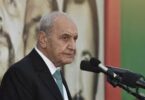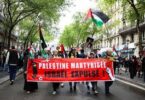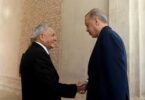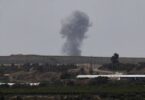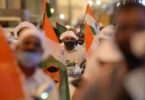F.P. Report
BERLIN: “If you don’t have facts, you don’t have truth; if you don’t have truth, you don’t have trust,” said Philippine journalist and Nobel Peace Prize laureate Maria Ressa at the opening of Deutsche Welle’s Global Media Forum (GMF).
Nobel Prize laureate Maria Ressa opened her keynote with the questions: “How do we rebuild trust? Because that is what illiberal governments have destroyed. If you don’t have integrity of facts, how can you have integrity of elections?” adding: “The three pillars of technology, journalism and the community will help rebuild trust in journalism.”
In his opening speech, DW Director General Peter Limbourg emphasized the challenges of reporting the war in Ukraine: “This is one of the times in history when journalism can definitely prove its relevance. We cannot stop the war, but we can contribute to decisive political action by keeping the fate of hundreds of thousands of people in the headlines,” he said. Limbourg: “We are facing a storm of disinformation, propaganda and censorship. When the free and independent voices work together, we can withstand this storm and make a difference.” In a video statement,
German Federal Minister for Foreign Affairs Annalena Baerbock commended this year’s DW Freedom of Speech Award laureates Mstyslav Chernov and Evgeniy Maloletka: “I’m delighted that the Global Media Forum is honouring them with the Freedom of Speech Award today. They stand for the courage of hundreds of journalists reporting from Ukraine.”
Baerbock: “I firmly believe that free and democratic societies need free media to inform citizens and hold those in power accountable. DW’s Global Media Forum is making a vital contribution to achieving this goal. People throughout the world rely on Deutsche Welle as a source for factual, objective and balanced reporting. Because truth is indispensable – in Mariupol and in Moscow, in Brussels and in Bonn.”
North Rhine-Westphalia’s Minister-President Hendrik Wüst stated in a video message that “freedom of expression and freedom of the press” are the “foundations of a liberal democratic society.”
Under this year’s theme “Shaping tomorrow, now,” GMF panel discussions and partner sessions will address how to promote resilient journalism and strengthen civil societies in times of crisis.
Guests from the world of politics joining the GMF today and tomorrow include Claudia Roth, Minister of State for Culture and the Media; Vera Jourová, Vice President for Values and Transparency at the European Commission; Audrey Tang, Taiwan’s Digital Minister; Laura Braam, Deputy Head of Law and Supervision of the Media Authority of the state of North Rhine-Westphalia; and Katja Dörner, Mayor of the City of Bonn.
Speakers from the fields of media, business and academia include Ukrainian UA:PBC journalist Angelina Kariakin; Timothy Snyder, Levin Professor of History at Yale University; Brazilian investigative journalist Patricia Toledo de Campos Mello; Guido Bülow, Head of News Partnerships for Central Europa at Meta; and Ulrik Haagerup, founder and CEO of the Danish Constructive Institute.
Against a backdrop of the war in Ukraine, the GMF will spotlight the challenges of reporting from the front lines by hosting war correspondents from war zones across the globe. Journalists from Germany, Ukraine and Russia such as Paul Ronzheimer, Angelina Kariakina, Tetjana Kyselchuk, Mikhail Zygar and Maria Makeeva will share how they cope with reporting on the war.
Later in the afternoon, DW will honor Ukrainian AP journalists Mstyslav Chernov and Evgeniy Maloletka with its Freedom of Speech Award in recognition of their courageous reporting from the besieged Ukrainian city of Mariupol. Ensaf Haidar, Saudi-Canadian human rights activist and president of the Raif Badawi Foundation for Freedom will attend the ceremony. Jodie Ginsberg, president of the Committee to Protect Journalists, will give a laudatory speech.

